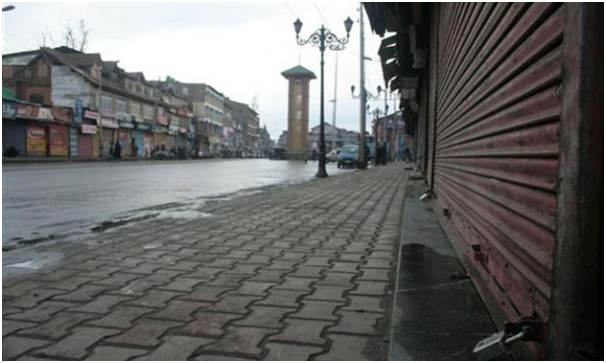Shut Down Yet Again in Kashmir
Representational image: Lal chowk, Srinagar during an earlier shut down

SRINAGAR: A partial to complete shutdown is being observed in Kashmir Valley following a shutdown call by separatist groups to commemorate October 27 as "Black Day" as a mark of protest against the landing of Indian armed forces in the State on this day in 1947.
All the shops, other business establishments and educational institutions are closed in the capital Srinagar with a thick presence of armed forces wearing riot gear across the city. A police officer said barricades have been set up at many roads in the city to thwart any protests.
Shutdown is also being observed in Anantnag, where tempers are running high following the murder of a Kashmiri trucker by Hindu far-right activists, along with Sopore, Pulwama, Baramulla, Shopian and Kulgam districts of the Valley.
The University of Kashmir has postponed all examinations scheduled today in the view of the strike call by the Hurriyat amalgams including Syed Ali Geelani's Tehreek-e-Hurriyat, Mirwaiz Umar Farooq's moderate Hurriyat, Nayeem Khan's Jammu Kashmir National Front, Shabir Ahmad Shah's Democratic Freedom Party and Jammu Kashmir Liberation Front.
The separatists have asked people to observe October 27 as "Black Day" as a mark of protest against the landing of Indian armed forces at the Srinagar airport after the last monarch of J&K, Maharaja Hari Singh, reportedly signed the "Instrument of Accession" with India.
There were reports of protests breaking out in parts of Srinagar and Anantnag on Tuesday afternoon. However, police said the protesters were dispersed, "Our forces are on a stand-by to deal with any eventuality. The situation is mostly peaceful across the Valley," the official said.
There are contesting versions about the events that led to the arrival of India's armed forces in the princely state of J&K following the bloody 1947 partition of the subcontinent. Authors like Alister Lamb have disputed the existence of the "Instrument of Accession" document.
Although India claims that her forces were invited by the Maharaja to help him ward off the tribal invasion by Pakistani raiders in the north of Kashmir Valley, new research reproduced by Christopher Snedden in his important book show that the Maharaja may have been forced to seek India's help in containing an indigenous rebellion in Poonch.



